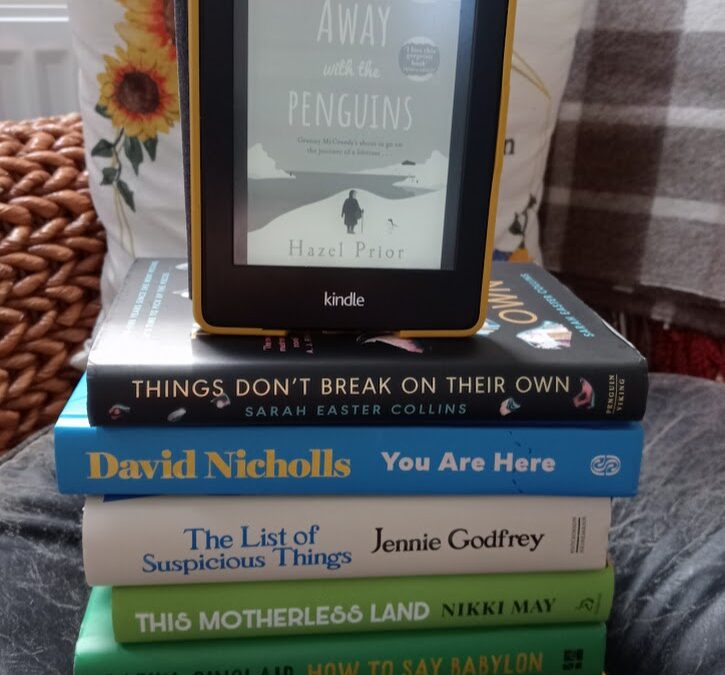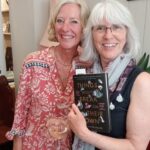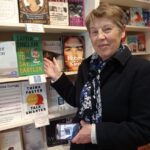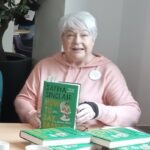We’re a funny lot, we writers. A big part of the job is the ability to sit in complete isolation, struggling alone to find order in the chaos that is our current work-in-progress. The job requires tuning out people, pets, plants, political debates – and that darn fly buzzing our heads – for fear of losing a half-formed thought that could make or break the plot. For the most part, writing requires all the social skills an introvert has to offer. These skills are typically beneficial. Until they aren’t.
When they aren’t, it’s probably because it’s publication time. Then the job requires the combined extroverted behaviours of a circus clown, a busker, and that kid that fought for the lead in the school play. I wonder what happened to him? Anyway, your extrovert self must now appear online, in person, and, if you’re lucky, on the radio or television. It must appear at the grocery store or in front of groups at the local library. If you’re lucky, it appears in larger settings, like conventions or book signings.
Out of our safe writing cocoons, writers may look like hedgehogs blinking in post-hibernation sunlight as we slink towards a lectern. I know I do. It takes guts to put yourself out in front of an audience. However, there are three things that give me the personal courage to code-switch from introvert to extrovert: writers, readers, and reviewers. Or as I like to call them, my Inspirational Trinity.
Firstly, let’s talk about writers. I understand you may consider me biased but I love meeting other writers. Chatting to them. Strategizing with them. We have common ground after all. Writers know the book you read in one afternoon took two years to write, and possibly twice as long to publish. We know about the rubbish bin, physical or virtual, piled high with screwed up sheets of rejected words. Tens of thousands of rejected words. Writers know about the complete manuscripts in drawers that will never see the light of a bookshop or feel the sweaty hand of a transfixed reader at the beach. We know.
We may have different publishing experiences – indie, traditional, bestsellers, optioned for screen, sales are up, sales are down. But we all have that common experience of exposing something very personal to an impersonal world. To do this, we need each other’s support.
Luckily for me, I was part of a fantastic writers group back in Wisconsin called Tuesdays With Stories. I met these authors after I’d published Dunster’s Calling but I couldn’t have finished More Or Less Annie without their support. Now I’ve moved back to England, I’ve been fortunate to cross paths with authors Sarah Easter Collins (Things Don’t Break On Their Own), Nikki May (Wahala), and Hazel Prior (Away With the Penguins). All three have catapulted into the publishing stratosphere with their various projects, yet they still make time to encourage other readers and writers.
- Writers Corner with Sarah Easter Collins, Hazel Prior, and Tracey Gemmell
- Book launch! Sarah Easter Collins and Tracey Gemmell
- Book launch! Nikki May and Tracey Gemmell
Over tea – and usually cake, if we’re huddled around the Writers Corner table at Periwinkle Cottage teashop on Exmoor (thanks Paul and David!) – we champion and challenge, commiserate and celebrate. ‘How’s the plot twist working?’ ‘Forget the deadline, write the book you want.’ ‘When’s the book launch?’ ‘OMG! Can you believe it’s been optioned for screen!’ ‘Does anyone have a bigger rubbish bin with a self-closing lid I could borrow?’ We speak the same language. The recent book release party for Sarah’s debut novel, Things Don’t Break On Their Own, and the Waterstones party for Nikki’s latest, This Motherless Land, were fabulous opportunities for us all to celebrate the process.
Secondly, there are the readers. Every writer was a reader first. Every. Single. One. I love fellow readers. There’s no dead air at a dinner party or business meeting if you’re sitting next to one. To chat with other readers and view the world through literary lenses – well, nothing beats it. And nothing inspires me to write better or dig deeper than a good book or an engaged reader.
While I still lived in the US, I met online the folks at Read With Yeovil. It’s a fabulous book club founded by Elaine Buckley and Elaine Sharp. Now I’m back in the UK, we meet in person. This group of diverse genre readers has introduced me to books I’d never have found without them. Recent examples include How to Say Babylon by Safira Sinclair, The Perfect Golden Circle by Benjamin Myers, You Are Here by David Nicholls, Hunted by Abir Mukherjee, and The List of Suspicious Things by Jennie Godfrey. Each book nudges the reader into new territory. Club meetings are never boring!
- Read With Yeovil book club
- Elaine Sharp, co-founder of Read With Yeovil
- Elaine Buckley, co-founder of Read With Yeovil
Thirdly, I must give a shout out to the reviewers. I love them too, (while also finding them incredible scary when it’s my own books being reviewed). I use their comments to make choices about what I read and, to a certain extent, how I write. They help me understand how I missed something in a best seller I couldn’t finish. The reviews I write may help others find a book I adored but no one else seems to be reading. Reviewers carry power and significant influence. I’m amazed at how many readers don’t know this.
If I find reviews helpful, I need to write them myself to give back. I can’t stress enough how important they are in the publishing process. Begging for reviews doesn’t come naturally to most writers. I cringe every time I ask readers to please, please, pretty please write a review of Dunster’s Calling or More Or Less Annie. Asking someone to spend about thirty seconds online to help promote something the writer spent countless years on seems, well, unseemly somehow.
But ask we must. Writers know that reviews drive the algorithms that dictate how much more time we get to spend writing books. We know that selling a book to a reader is only half the battle. That review, whether it’s a simple star rating or a multi-paragraph writeup, energizes us, pushes us harder, and, hopefully, allows us a delightful reason to pat ourselves on the back. (Unless our hands are full of rejected pages heading for the bin, that is.)
I recently gave a presentation at my local library, encouraging others to write reviews. A library, you say? But library patrons don’t buy books, you say. They can’t write reviews, you say. Not so fast, I say. Anyone can write a review, whether they bought, borrowed, or found a book.
On my way to the Persephone Festival in April, I swapped books with a lady sitting near me on the train. Though we didn’t buy both books, we can review both books. Readers who rummage (Oh, there’s a book club title!) through second hand bookshops, garage sales, Little Library book boxes, or grandma’s attic, can all leave reviews in places that really help authors (Amazon, Goodreads, Waterstones, etc.). I may argue, if you read a book for free or for a few pennies, your obligation to support that author increases. All that work deserves recognition and with AI chomping at the bit, reviews help flesh-and-blood authors compete.
My next blog will provide more details on how and why and where to post reviews. However, let me end today by thanking all the wonderful writers, readers, and reviewers out there. I couldn’t possibly mention you all but you are all greatly appreciated. You make the isolation of writing and the strapping on of the extrovert shoes worth it. Your encouragement and friendship are the icing on this introverted writer’s literary cake.
Images: author’s own








